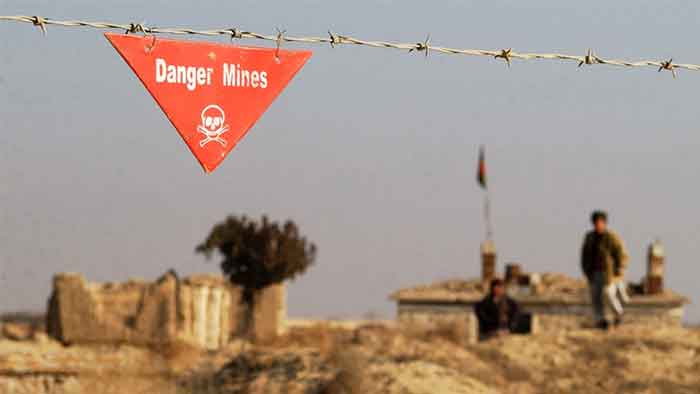
An advisor to the Iraqi parliament’s foreign affairs committee said: Iraq government is planning to lodge an international lawsuit against the U.S. for violating the country’s sovereignty and using internationally-banned munitions in civilian areas.
Hatif al-Rikabi told Arabic-language al-Maalomah news agency in an interview that Iraq is going to file the case at Swedish and German courts over appalling crimes that the U.S. has perpetrated in the Arab country, including the use of depleted uranium weapons.
Rikabi went on to say such a measure will ensure international accountability for the U.S., and will not give it the chance to procrastinate the case.
U.S.-led wars in Iraq have left behind hundreds of tons of depleted uranium (DU) munitions and other toxic wastes.
Official Iraqi government statistics show, prior to the outbreak of the First Persian Gulf War in 1991, the rate of cancer cases in Iraq was 40 out of 100,000 people. By 1995, it had increased to 800 out of 100,000 people, and, by 2005, it had doubled to at least 1,600 out of 100,000 people. Current estimates show the increasing trend continuing.
Contamination from DU munitions and other military-related pollution is suspected of causing a sharp rise in congenital birth defects, cancer cases, and other illnesses throughout much of Iraq.
Many doctors and scientists maintain that the recent emergence of diseases that were not previously seen in Iraq, such as new illnesses in the kidney, lungs, and liver, as well as total immune system collapse, are connected to public exposure to war contaminants.
The DU contamination may also be related to the substantial rise in leukemia, renal, and anemia cases, especially among children.
Moreover, there has also been a dramatic jump in miscarriages and premature births among Iraqi women, particularly in areas where heavy US military operations occurred, such as Fallujah.
During 2004, the U.S. military carried out two massive military sieges of the city of Fallujah, using large quantities of DU ammunition, as well as white phosphorous.
The U.S. first used DU ammunition against Iraq during the Gulf War of 1990-1991, and then again during the 2003 invasion.
According to available estimates, the U.S. contaminated Iraq with at least 2,320 tonnes of the highly toxic substance, with DU affecting both the U.S. servicemen and Iraq’s civilian population.
“Hundreds of cancer cases are recorded every month, and the figure is clear evidence of how much damage the U.S. forces have done,” al-Rikabi was quoted as saying.
The official also called on Iraq’s health authorities to “release facts and figures about casualties caused by U.S. bombing campaigns.”
According to al-Maalomah, the US attacked Iraqis using depleted uranium three times – in 1991, 1999 and 2003. These attacks are said to have affected hundreds of thousands of Iraqis, who have suffered from a heightened incidence of cancers, strokes, kidney, lung and liver diseases, miscarriages, premature births and congenital deformities. Wide swathes of the country have been contaminated with radioactive debris.
At the same time, the agency said, the Iraqi government has failed to clean up the pollution caused by the bombings, or put pressure on the international community to oblige the US and its allies either to engage in a clean-up or provide Iraq with financial compensation to deal with the disaster.
Particularly high incidences of illness have been reported in Baghdad, Basra and Fallujah, with birth defect rates in the last of these areas reaching levels up to 14 times above those in Hiroshima and Nagasaki, the two Japanese cities that the U.S. atom-bombed in 1945.
According to UN estimates, the U.S. used at least 230 tonnes of DU munitions in Iraq in 1991, and over 2,000 tonnes more in 2003.
Along with Iraq, the U.S. and NATO used DU munitions on a large scale in Bosnia in 1995, in Serbia and Kosovo in 1999, and in Syria in 2015.
Families suing South Africa’s MTN for allegedly aiding militants want case heard in U.S.
A Reuters report from Johannesburg said:
Families of hundreds of U.S. soldiers who are suing South African telecoms firm MTN for allegedly aiding militant groups in Afghanistan have filed papers challenging the firm’s argument that the case should not be heard in the United States.
The original suit, filed in December 2019 in the United States District Court in the District of Columbia, alleges that MTN violated the U.S. Anti-Terrorism Act by paying protection money to al-Qaeda and the Taliban.
MTN, Africa’s largest mobile operator by subscribers, has denied the allegations, and reiterated it would “defend its position accordingly.”
In new court papers, filed on Tuesday by Washington-based law firms, the families’ argue that MTN must be held accountable in a U.S. court for the alleged offence.
“The Court should recognise and reject MTN’s argument for what it is: an attempt to enshrine a rule that a foreign company can obtain U.S. financing, use the financing to support terrorist attacks on Americans, and face no accountability for doing so,” the papers read.
The case centres around allegations that MTN paid more than $100 million to al-Qaeda and the Taliban so its cellular towers would not be targeted for destruction. MTN deactivated those towers at night, preventing U.S. intelligence operations, according to the suit.
In September, MTN lodged a motion to dismiss the suit, arguing the United States was not the proper jurisdiction for the case, and that it did not knowingly support the groups.
MTN head of corporate affairs Nompilo Morafo said on Wednesday MTN would “defend its position accordingly”, adding that the suit was not “viable”.
“MTN requested that the court end the lawsuit and grant a judgment in MTN’s favour for two independent reasons: because the court lacks jurisdiction over MTN, which does not operate in the U.S., and because the complaint does not allege any conduct by MTN that violated the Anti-Terrorism Act,” said Morafo.
MTN said it would now be allowed to file a written reply in support of its motion by Feb. 5.
SIGN UP FOR COUNTERCURRENTS DAILY NEWSLETTER












































